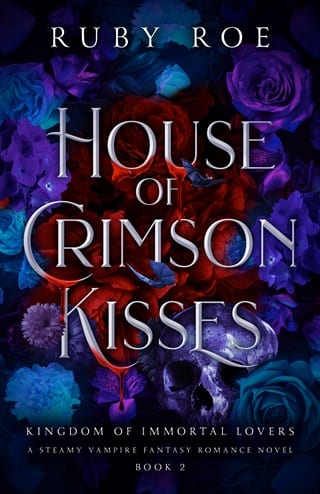Chapter 35
CORDELIA
One Thousand Years Ago
I am sitting in a carriage as I pull out a scribing tool and journal. Before what comes next, I need to think.
To work out where it all went wrong.
So, I put pen to paper and begin to write.
* * *
T he problem with running is that it doesn't actually solve the issue, it just delays it.
As we grow and age, there are many lessons we learn. Unfortunately for Eleanor and me, despite our combined fifty years between us, we had not considered the fact that running wouldn't really resolve our issues.
The worst—and by that I mean the most important—lessons are usually learnt through repetition. For want of a better analogy, these lessons are always death by a thousand paper cuts.
For two years, we ran.
Two years we spent hiding and hunting for a new place to call home.
And two years our families sent men to hunt us down like common vermin.
We never really found a home. Sure, we oft settled for a few weeks; once, we even spent five months in the same place. But the rumours would always find their way to us. A whispered comment, a note slipped past our threshold, an overheard conversation.
What both Eleanor and I failed to account for was the ruthless determination that our families possessed.
For we had stolen from them.
We were not free agents. We were not our own people. And according to them, we did not have the right to run free.
We were symbols. Heirs. Pawns.
Both of us belonged to, or perhaps I should say, were owned by our elders. The Matriarch and Patriarchs of our family.
We were duty bound, and our families did not take the responsibility of duty lightly.
We ran from the hospital gleefully. So full of hope and joy, and we genuinely thought we'd won.
Eleanor healed people for coin. I was her assistant. Sometimes I was a farmhand, sometimes I tended tables. It was a far cry from our lives of wealth and privilege. But we made do as much as we made love. We had nothing, but we wanted for nothing either.
It was joy.
It was bliss.
It was a little piece of paradise.
We skipped from town to town, village to suburb. Searching for a place to call home.
Except we never found it. We were searching for something that could not be.
One might have concluded that the reason we could never find that place to call home is because blood does not a family make.
It does, however, create a tie.
A bond.
A noose.
Of course, they came for us.
And perhaps if we hadn't been so young, so na?ve, maybe we would have recognised our efforts as the idealistic dreams they were far sooner.
But like any young fools in love, we fought back. We tried disguises and hats. We cut our hair and wore men's clothes.
But in every village we encountered, we stuck out. We didn't belong anywhere. No matter how we tried, no matter how we ran or hid or plotted.
They just kept coming.
And eventually they began to catch up. At first, we had months together in peace. Months of bliss until the hairs on our arms would stand on end. Months before the first prickle of eyes on our backs, before gooseflesh would crawl over our skin as the eyes of our families' henchmen watched us.
We escaped by night, by day, by boat and by carriage and once in the bellies of a farmer's barrels.
We were industrious, and for a time, we were proud and filled with the glory of winning.
But even winning can wear a person down when there's no rest or recovery.
They were relentless, their slow inevitable march towards us, our slow inevitable march towards capture. The months shrank to weeks. Then days.
Until we forgot how to dream, how to win, how to run.
We grew so tired that even clinging to each other by our fingertips felt wearying.
Oh, how we loved each other.
Oh, how we lost each other.
But I suppose that's the problem with dreams. They always come to an end...
 Fullepub
Fullepub 



